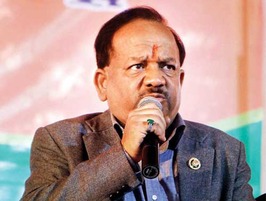
NEW DELHI - Seeking to end an "unseemly controversy" kicked up by his views on sex education, Union Health Minister Harsh Vardhan June 27 denied that he proposes a ban on sex education in schools, saying he supports "pedagogy that is scientific and culturally acceptable". In a statement, the health minister said that an "unseemly controversy is sought to be generated" in the media over his criticism of...

"so-called sex education" in his personal web site, www.drharshvardhan.com/drharshvardhan-views-on-education.aspx. He also criticized the previous United Progressive Alliance (UPA) government's "crudity and graphic representation of culturally objectionable symbols" in its sex education programs. The minister, who is on an official visit to the US, said: "I am a medical professional who has embraced rationalism and I whole-heartedly support pedagogy that is scientific and culturally acceptable. Anything abrasive to common sensibilities and articulated as such by responsible persons should be discarded and replaced by consensually accepted learning processes." He clarified that the view expressed on the web site was "entirely his own" and made in the context of the UPA government's 2007 decision to introduce the Adolescence Education Program (AE) in its original form. "Even the chief ministers of UPA-ruled states had objected to it and subsequently it was modified," he said.
He said as chief ministerial candidate of his party in the 2013 Delhi assembly election, he had "full right to make transparent his agenda for education, among other subjects of governance. Value-based school learning processes are common in all countries and he had intentioned implementing such a format in Delhi's schools".
"Crudity and graphic representation of culturally objectionable symbols as manifested in the UPA's so-called sex education program cannot be called sex education. Every education system must strive to have an ideal curriculum and to that extent my stand is valid." The minister, who had held the education portfolio (along with health) in the BJP's Delhi government between 1993 and 1998, said he "introduced several lasting reforms in the curriculum of the state's schools in consultation with experts. There was a sex education component in the curriculum then too but nobody reported objections with it".
"Sex education that builds societies free of gender discrimination, teenage pregnancy, HIV-AIDS proliferation, pornography addiction, etc. should be the goal," he said. The opposition Congress said the party wanted to point out to the health minister that birth control, use of condoms and contraceptives, prevention of sexually transmitted diseases, including HIV-AIDS and sex education are "part of declared national and international policies". (IANS)
He said as chief ministerial candidate of his party in the 2013 Delhi assembly election, he had "full right to make transparent his agenda for education, among other subjects of governance. Value-based school learning processes are common in all countries and he had intentioned implementing such a format in Delhi's schools".
"Crudity and graphic representation of culturally objectionable symbols as manifested in the UPA's so-called sex education program cannot be called sex education. Every education system must strive to have an ideal curriculum and to that extent my stand is valid." The minister, who had held the education portfolio (along with health) in the BJP's Delhi government between 1993 and 1998, said he "introduced several lasting reforms in the curriculum of the state's schools in consultation with experts. There was a sex education component in the curriculum then too but nobody reported objections with it".
"Sex education that builds societies free of gender discrimination, teenage pregnancy, HIV-AIDS proliferation, pornography addiction, etc. should be the goal," he said. The opposition Congress said the party wanted to point out to the health minister that birth control, use of condoms and contraceptives, prevention of sexually transmitted diseases, including HIV-AIDS and sex education are "part of declared national and international policies". (IANS)

 RSS Feed
RSS Feed
